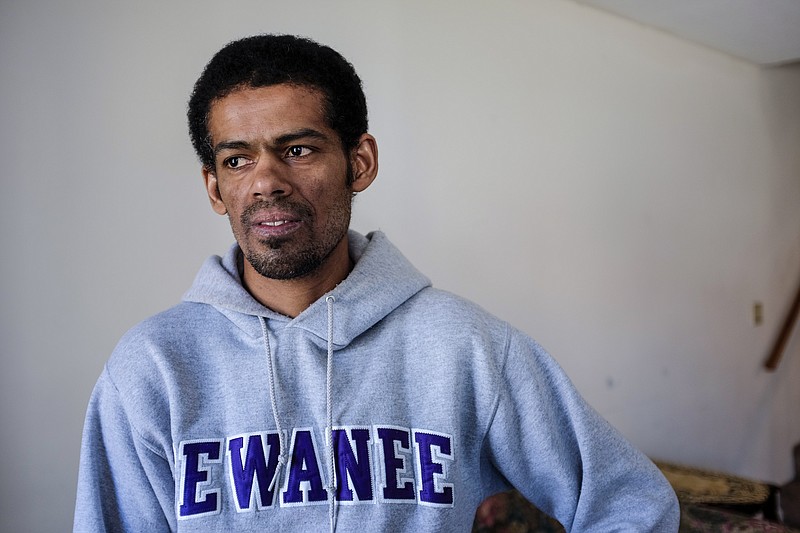HOW TO HELP
Donations for Sultan Raheem may be sent to Regions Bank, 601 Market St., Chattanooga TN 37402. Support Paul Braun's work to rescue Philip at GoFundMe.com/Helping-Philip.
I first met Sultan Raheem in his small apartment near M.L. King Boulevard. I sat near him on the couch, which was donated. (As were many things there, including a new set of mattresses. The old ones had to be thrown out because of bedbugs.)
His wife served us a dried citrus tea called numi. It was an act of Muslim hospitality, a custom they brought from Iraq to America. It was also delicious. I had seconds.
Nearby, their children watched "Power Rangers" on the TV while climbing on and off their father's lap. Raheem, 38, coughed frequently and spoke softly.
It was all very humble, almost meek.
I almost forgot I was in the presence of an American hero.
"Acts of bravery that you could write books about," said U.S. Army Sgt. Paul Braun.
In 2009, Raheem and his family lived in Basra, Iraq. That's how he met Braun. It was wartime, and the Americans had built nearby a military base called Camp Bravo.
It needed guarding.
Each day, hundreds of Iraqis would come to the gates of Camp Bravo, along with trucks, cars, motorbikes. American soldiers needed interpreters -- Iraqis who could go from Arabic to English and back again. Iraqis with quick eyes who knew the local customs. Iraqis who supported America.
That was Raheem.
He worked as an interpreter at Delta Gate at Camp Bravo.
"If I saw something wrong at the base, I would speak up right away," Raheem said.
Growing up in Kuwait, he'd always loved America. He learned English early in school. He'd watch "The Cosby Show" and "Knight Rider" on the satellite TV.
"My dream," he said. "Coming to the States."
In the 1990s, he and his family moved to Iraq. Life under Saddam was extreme.
Then came 9/11.
Then came the Americans.
Raheem, and other Iraqis, chose sides.
"They became one of us," Braun said from his home in Minnesota. "We fought next to them, ate next to them, bled with them and in some cases, we died with them."
Raheem couldn't cover his face to keep his identity secret; it was too hot outside. Saddam loyalists fired mortars at the base. Many tried to sneak in with hidden cameras. Others would pack bombs hidden in trucks or cars.
Raheem would spot them. The way they fidgeted. The words they muttered from behind the wheel.
"These were people risking their lives ... for American soldiers," Braun said.
When American forces left Iraq, interpreters were left behind. Braun called it an act of betrayal -- the U.S. had promised them safe passage here. Yet many are still in Iraq, including an Iraqi named Philip, who was Braun's personal interpreter.
"Philip's aunt and uncle were just murdered by ISIS three weeks ago," said Braun.
The U.S. government has rejected the immigration paperwork for Philip's family, so Braun is trying to rescue them on his own. He's set up a GoFundMe.com page ("Philip Saved American Lives") to hire private contractors to extract Philip and his family and bring them to America before they are killed.
"They are executing these people for what they did for us," said Braun, whose story has gotten national attention.
Raheem was lucky. In November 2013, after months of trying to secure immigration status, he and his family arrived here. A local refugee agency took them in, and Sultan began work cleaning machines at a local processing plant, making $8.50 or so an hour.
Then, last fall, doctors diagnosed him with leukemia.
He stopped working and began accepting food stamps.
Then his wife -- who delivered their third child while Sultan was in the hospital -- got sick and needed surgery. His son, too. And Sultan's still receiving chemo.
One anonymous donor has paid their rent through March, but then ... well, Sultan isn't sure how to interpret the life before him.
"It's a bad start for us here," he said.
He and other Iraqi interpreters helped save so many American lives.
Can America save theirs?
Contact David Cook at dcook@timesfreepress.com or 423-757-6329. Follow him on Facebook and Twitter at DavidCookTFP.

